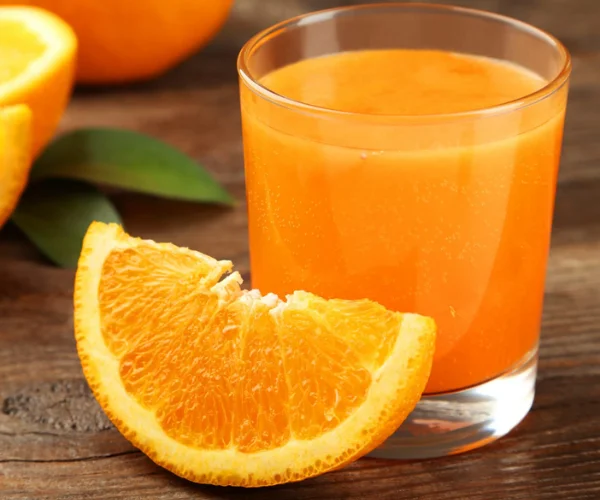Have you ever poured a glass of orange juice, expecting that familiar smooth and tangy taste, only to be met with an unexpected fizz?
I’ve experienced this odd sensation, and it led me to wonder, “Why is my orange juice carbonated?”
At first, I thought maybe it was a one-off, a fluke in the bottling process. But as I dug deeper, I discovered that there are a few reasons this can happen.
Sometimes, it’s a natural process, where fermentation occurs due to the sugars in the juice interacting with natural yeasts. Other times, it might indicate that the juice has started to spoil.
In my journey as a food expert, I’ve learned that understanding these subtle cues can enhance our food experiences and safety.
Contents
- 1 Why Is My Orange Juice Carbonated?
- 2 Is Orange Juice Supposed To Be Carbonated?
- 3 How Long Does It Take For Orange Juice To Become Carbonated?
- 4 Does Carbonated Orange Juice Taste Good?
- 5 Is It Safe To Drink Carbonated Orange Juice?
- 6 Is Tropicana Orange Juice Carbonated?
- 7 How To Prevent Orange Juice From Becoming Carbonated?
- 8 Conclusion
Why Is My Orange Juice Carbonated?
Your orange juice has turned fizzy because it’s either past its expiration date or it was left out at room temperature for too long.
Orange juice comes with a sell-by date to guarantee its freshness and quality when consumed.
However, after this date, or if the juice is not stored properly, bacteria can start to multiply, even in the fridge.
Moreover, letting your orange juice sit out at room temperature can also trigger carbonation.
This happens as the juice undergoes fermentation, producing carbon dioxide gas, which gives it that fizzy sensation.

Also here are some reasons:
Fermentation:
This is the most common reason. If orange juice is stored for too long or at improper temperatures, natural sugars in the juice can start fermenting due to the action of wild yeasts or bacteria present.
Fermentation produces carbon dioxide, which leads to the carbonation effect.
This process can also change the flavor of the juice, often making it taste sour or alcoholic.
Contamination:
If the juice has been contaminated with some form of bacteria or yeast from the environment, these microorganisms can also cause fermentation.
Chemical Reaction:
Though less common, certain chemical reactions can also produce gases. This is unlikely with commercially prepared orange juice but could theoretically happen due to contamination or interaction with other substances.
Packaging Error:
In very rare cases, there might be a mistake in the packaging process that introduces carbonation, but this is highly unlikely with reputable brands.
If your orange juice is carbonated and wasn’t bought that way, it’s usually a sign that it has gone bad and should not be consumed.
Fermented orange juice could potentially make you sick, especially if the fermentation is due to harmful bacteria. It’s best to dispose of any orange juice that tastes or smells off.
Is Orange Juice Supposed To Be Carbonated?
No, orange juice is not supposed to be carbonated. If you find your orange juice fizzing, it’s a sign that something’s off. Usually, it means the juice has started to ferment, which isn’t good.
I always check the expiration date and keep my juice in the fridge to avoid this.
Remember, fresh orange juice should be smooth and refreshing, without any bubbles.
How Long Does It Take For Orange Juice To Become Carbonated?
The time it takes for orange juice to become carbonated due to fermentation can vary.
It depends on several factors like temperature, the presence of fermenting bacteria or yeast, and how much sugar is in the juice (since sugar feeds the fermentation process).
In a warm environment, fermentation can start within a few days. If the juice is left out at room temperature, you might notice signs of fermentation, such as a slight fizziness or off-taste, in as little as 24 to 48 hours.
In the fridge, this process is much slower because cold temperatures slow down bacterial growth and fermentation.
It could take a week or more for noticeable changes to occur in refrigerated orange juice.
Keep in mind, these are rough estimates. Always use smell and taste to judge if your orange juice is still good to drink. If it tastes or smells off, it’s best to throw it out.
Does Carbonated Orange Juice Taste Good?
If the carbonation in your orange juice is a result of unintentional fermentation, the taste might not be pleasant.
This kind of carbonation can give the juice a sour or off flavor, different from what you’d expect from intentionally carbonated drinks.
When you notice fizz and bubbles in your orange juice, it’s a sign that something’s not right. Carbonation in orange juice isn’t desirable and typically indicates it’s no longer safe to consume.
Fermented orange juice can also have a slightly alcoholic taste due to the fermentation process, which might not be to everyone’s liking.
If you’re curious about carbonated orange juice, I’d recommend trying a commercially produced version rather than waiting for regular orange juice to ferment.
Is It Safe To Drink Carbonated Orange Juice?
If your orange juice has become carbonated on its own, it’s usually not safe to drink.
This natural carbonation often results from fermentation, where bacteria or yeast have started to break down the sugars in the juice, producing carbon dioxide gas and possibly alcohol. This process can also lead to the creation of harmful by-products.
Drinking such fermented orange juice might not make everyone sick, but it can cause stomach discomfort, nausea, or other digestive issues for some people.
The taste will also be off, likely sour or even somewhat alcoholic, which is not what you want from orange juice.
Is Tropicana Orange Juice Carbonated?
No, Tropicana orange juice is not carbonated. Tropicana produces a variety of orange juice products, all of which are non-carbonated and focus on delivering the natural flavor of oranges without any added fizz.
If you encounter a bottle of carbonated Tropicana orange juice, it might be a sign of fermentation or spoilage, and it would be best not to drink it.
How To Prevent Orange Juice From Becoming Carbonated?
To prevent your orange juice from becoming carbonated, which can happen due to unintentional fermentation, follow these tips:
1. Store it properly: Keep your orange juice in the refrigerator at all times. Cold temperatures slow down the fermentation process caused by yeast and bacteria.
2. Seal the container: Always make sure the orange juice container is tightly sealed. This helps to minimize exposure to air, which can introduce contaminants that might lead to fermentation.
3. Consume quickly: Try to consume the orange juice within a week of opening it, even if the sell-by date is further out. The fresher it is, the less likely it will ferment.
4. Check the expiration date: Always consume your orange juice before the expiration or best-by date on the package to ensure it’s at its best quality and safe to drink.
5. Buy pasteurized: Pasteurized orange juice has been heat-treated to kill bacteria and enzymes that can cause spoilage and fermentation. This can help extend its shelf life.
6. Avoid cross-contamination: Use a clean glass or pitcher every time to avoid introducing bacteria into the juice container.
Following these steps can help ensure your orange juice stays fresh, delicious, and free from unwanted carbonation.
Conclusion
The mystery of carbonated orange juice is multifaceted, with factors ranging from natural fermentation to storage conditions.
By understanding the intricate journey from orchard to glass, consumers can make informed choices and better appreciate the nuances of this beloved beverage.
While carbonation may catch you off guard, knowing the contributing factors empowers you to make informed choices when selecting your next bottle of orange juice.

Welcome to alljuicecorner.com, your go-to resource for all things juice! I’m Marina, the passionate juice enthusiast and health advocate behind this vibrant community. My journey into the world of juicing began five years ago, sparked by a desire to embrace a healthier lifestyle and explore the nutritional power of fruits and vegetables. I spent countless hours researching, experimenting with different combinations, and understanding the science behind each sip.
I bring a wealth of knowledge and practical experience to the juice table. My mission is simple: to share the joy and health benefits of juicing with as many people as possible. Through “alljuicecorner.com,” I aim to demystify the world of juicing, offering easy-to-follow recipes, tips on selecting the right produce, and insights into the health benefits of various ingredients. Whether you’re a seasoned juicer or just starting, this blog is designed to be your companion on this delicious journey.
